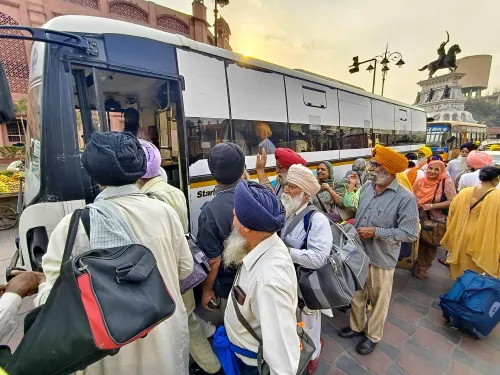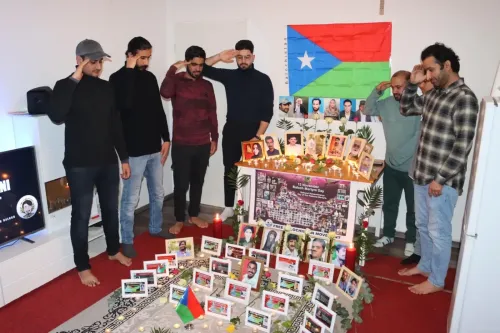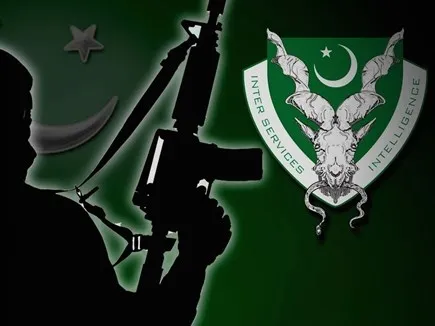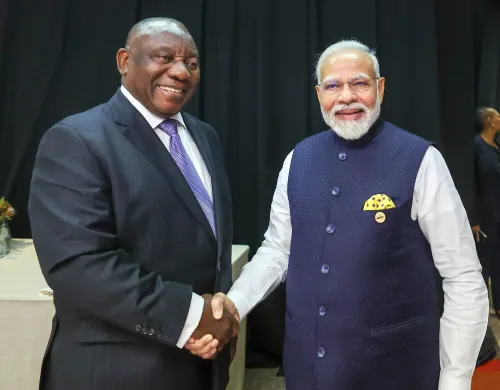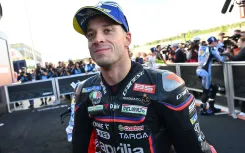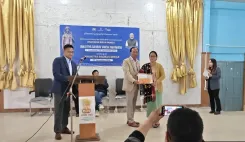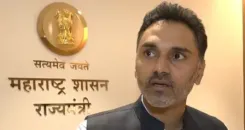Emergency EU Summit Addresses Ukraine Aid and Security Amidst Dwindling US Support
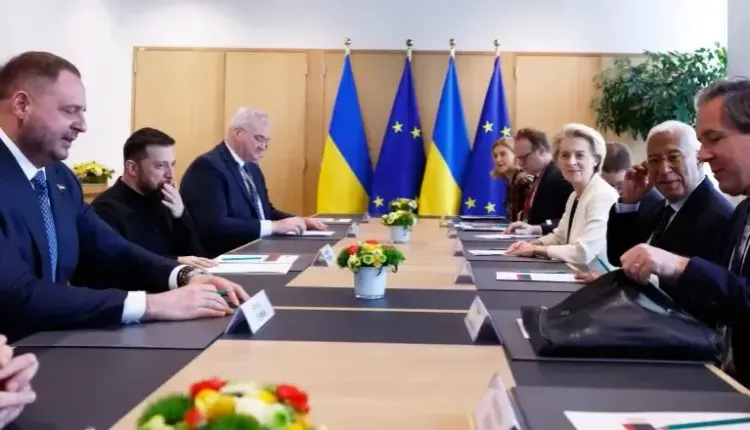
Synopsis
Key Takeaways
- EU leaders convened an emergency summit in Brussels.
- Focus on enhancing defense commitments for Ukraine.
- Leaders discussed increasing military spending across Europe.
- Unity among EU nations against Russia's threats.
- Proposals for a coalition to support Ukraine in peace negotiations.
Brussels, March 7 (NationPress) European Union leaders have gathered for an emergency summit in Brussels to tackle rising security issues following the halt of US military aid to Ukraine.
During the assembly on Thursday, the focus was primarily on enhancing defense commitments and ensuring ongoing assistance for Ukraine.
EU leaders pledged to collaborate in fortifying the continent's defenses and to allocate hundreds of billions of euros towards security, in light of US President Donald Trump's consistent warnings about potentially abandoning them in the face of Russia's threat.
With an increasing belief that they must now rely on themselves, nations that have historically underinvested in defense convened in Brussels to discuss innovative methods for enhancing their security and guaranteeing future protection for Ukraine.
This summit marks the first gathering of the 27 nations since an intense meeting in Washington, DC, last week between US President Trump and Ukraine's Volodymyr Zelensky. The Trump administration has announced a freeze on military aid and halted intelligence-sharing with Ukraine—decisions that could have severe repercussions for Ukraine's military efforts.
Attendees included President Zelensky, European Commission President Ursula von der Leyen, European Council President Antonio Costa, and French President Emmanuel Macron, who stated on Wednesday that Russia now poses a significant threat not only to Ukraine but to Europe as a whole.
The 27 EU leaders approved a resolution to relax budget constraints, enabling willing EU nations to boost their military expenditures. They also urged the European Commission to explore new avenues to facilitate substantial defense spending at the national level across all member states, as noted in a statement.
The EU's executive branch estimates that approximately 650 billion euros ($702 billion) could be mobilized in this way.
The leaders acknowledged a commission proposal for a loan package amounting to 150 billion euros ($162 billion) aimed at purchasing new military equipment and requested EU headquarters staff to consider this proposal with urgency.
Despite Hungarian Prime Minister Viktor Orban's refusal to endorse part of the summit's statement supporting Ukraine, the remaining 26 EU leaders unified in their stance that negotiations concerning Ukraine cannot occur without its involvement, and that Europeans must be included in any discussions related to their security. So far, European nations have been sidelined in the US-led negotiations with Russia.
A key outcome of the summit was a renewed commitment from European leaders to increase their defense budgets.
Amid the ongoing war in Ukraine and a desire for Europe to become less reliant on US support, leaders deliberated on enhancing the continent's military capabilities. The European Commission suggested measures like fiscal flexibility and joint borrowing to assist member states in amplifying their defense spending.
Von der Leyen cautioned that Ukraine—and Europe overall—has reached a critical juncture.
"Europe faces a clear and present danger, and thus, Europe must be capable of protecting and defending itself. We need to enable Ukraine to safeguard its own interests and advocate for a lasting and just peace," she stated.
Hungarian Prime Minister Viktor Orban also advocated for enhancing the defense capabilities of European nations.
Following discussions with Macron in France on Wednesday, Orban mentioned on X that his meetings reaffirmed their agreement on the necessity to strengthen European nations' defense capabilities.
Luxembourg's Prime Minister Luc Frieden echoed the sentiment, stressing that Europe must bolster its defense capabilities, even if some member states disagree.
"We require more European defense, and if one or two countries dissent, others should proceed as much as possible. That is my advocacy," Frieden stated prior to the meeting in Brussels.
Zelensky has continued to receive steadfast support from European leaders, who also deliberated on expanding military aid and potential security guarantees for Ukraine.
Zelensky expressed gratitude to European leaders for their unwavering support, emphasizing that it signified Ukraine was not "alone" in its struggle against Russia's invasion.
"Your strong signal to the Ukrainian people is of great importance," he remarked.
Outgoing German Chancellor Olaf Scholz reiterated a firm stance against any "dictated peace" in Ukraine, as discussions between Washington and Moscow raise fears of an unfavorable resolution being imposed on Kyiv.
"It is crucial to ensure that Ukraine does not have to accept a dictated peace, but rather a just and fair peace that guarantees its sovereignty and independence," Scholz stated.
At least 20 nations, primarily from Europe and the Commonwealth, have shown interest in joining a "coalition of the willing" proposed this week by UK Prime Minister Keir Starmer to support Ukraine.
Starmer indicated that the UK, France, and other nations would form this coalition to develop plans for aiding Ukraine should a peace agreement be reached to conclude Russia's war.
Countries that have publicly expressed willingness to consider sending peacekeepers to enforce a settlement include Australia, Ireland, Luxembourg, Belgium, and Turkey, which boasts the second-largest army in NATO after the US.
Several other countries, including Canada, Denmark, and Sweden, have not ruled out deploying soldiers.
Although details remain in discussion, the message is clear: Europe stands united in support of Kyiv in the face of Russia.
"Europe as a whole is genuinely capable of triumphing in any military, financial, or economic confrontation with Russia. We are simply stronger," stated Polish Prime Minister Donald Tusk.
"We just needed to start believing in this, and it appears to be happening now."
During the summit, Belgian Prime Minister Bart De Wever announced that his country anticipates delivering F-16 fighter jets for operations in Ukraine by 2026, noting that the delivery had been postponed due to Belgium awaiting new F-35s to replace them.
Sweden declared it would send up to eight Gripen fighter jets as part of a NATO mission to oversee the airspace of Poland, which borders Ukraine.
This comes after Sweden suspended its plans to dispatch its domestically developed Gripen fighter jets to Ukraine the previous year.
A particularly notable moment at the summit was Macron's proposal to extend France's nuclear deterrence umbrella to other EU nations.
This initiative aims to fortify Europe's defense stance but received mixed responses. Some leaders endorsed the idea, while others raised concerns regarding the complexities of nuclear policy within the EU.
Poland and the Baltic nations welcomed Macron's proposition.
Scholz expressed reservations, emphasizing the existing deterrence system of NATO and advocating for increased defense expenditures throughout Europe instead.
When asked about France's offer, Scholz stated, "What we have regarding nuclear participation… I don't believe that should be relinquished."
Despite strong support for enhancing defense capabilities, divisions persisted regarding funding Europe's increased defense efforts. Some nations, including Hungary, have expressed skepticism about joint financing plans and proposed defense commitments.
Russia, on the other hand, declared it would not accept the presence of European peacekeepers in Ukraine, asserting that it would indicate direct NATO involvement in the conflict.
The Kremlin also vehemently condemned Macron's assertion about Russia's "threat to Europe" and the necessity for unity as "extremely confrontational."
His address suggested that France is contemplating "continuing the war," according to Russian Foreign Minister Sergey Lavrov.
In his remarks on Wednesday to women who have lost relatives in the conflict, Russian President Vladimir Putin stated that his nation should pursue a peace strategy in Ukraine that ensures Russia's long-term security and sustainable development.
"We must select a peace option that suits us and guarantees long-term peace for our country," Putin asserted.
"We seek nothing else, but we will not relinquish our own," he added.
While the summit highlighted Europe's resolve to support Ukraine and enhance its defense capabilities, it also unveiled ongoing discussions concerning funding and strategic direction.
The forthcoming months will be crucial as EU leaders strive to translate these discussions into concrete actions, ensuring Europe can maintain its commitment to supporting Ukraine while reinforcing its own security, experts noted.

